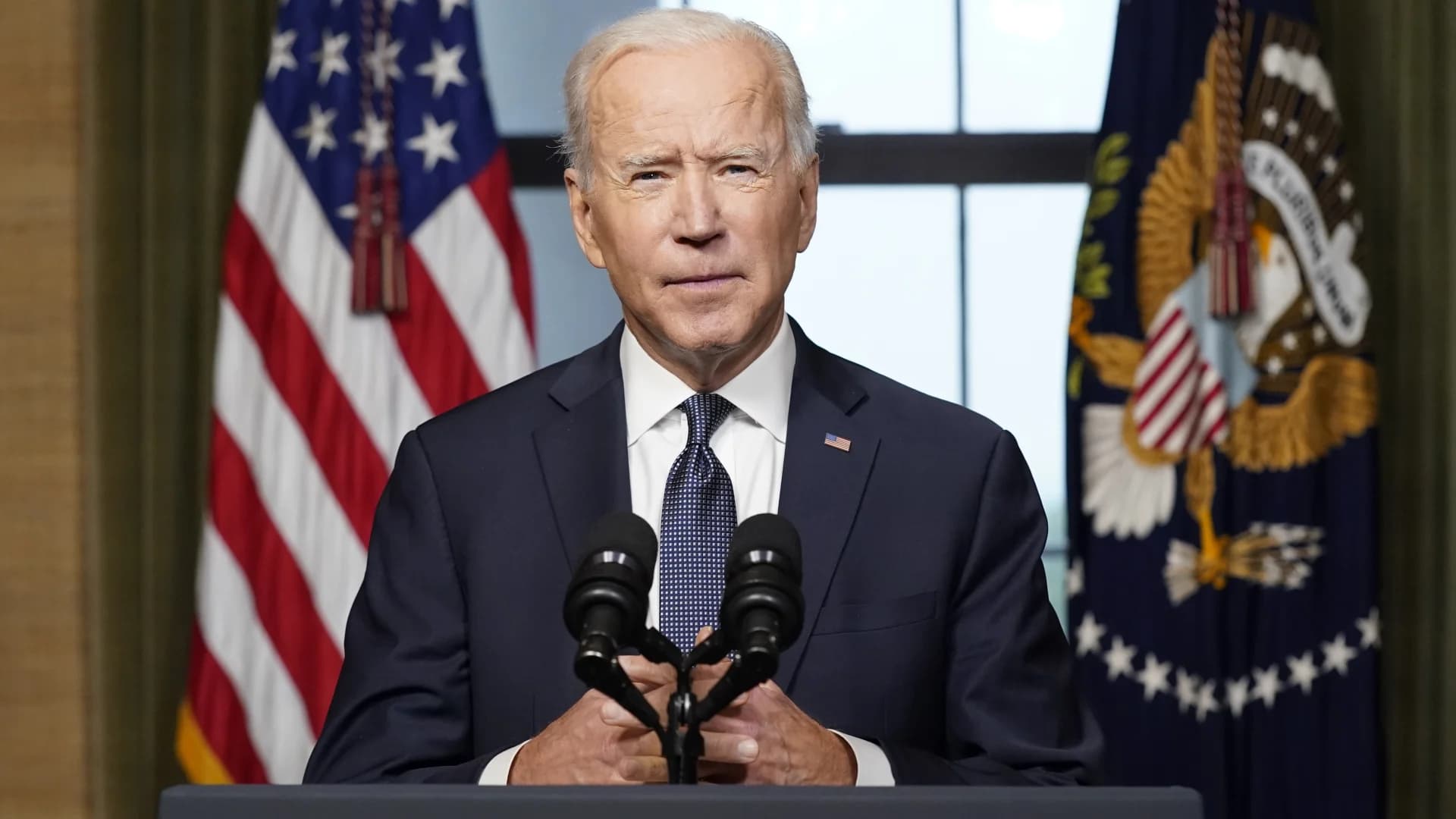More Stories

President Joe Biden said Wednesday he will withdraw remaining U.S. troops from Afghanistan, declaring that the Sept. 11 attacks “cannot explain” why American forces should still be there 20 years after the deadliest terror assault on the United States.
His plan is to pull out all American forces — numbering 2,500 now — by this Sept. 11, the anniversary of the attacks, which were coordinated from Afghanistan.
The U.S. cannot continue to pour resources into an intractable war and expect different results, Biden said.
The drawdown would begin rather than conclude by May 1, which has been the deadline for full withdrawal under a peace agreement the Trump administration reached with the Taliban last year.
“It is time to end America’s longest war,” Biden said, but he added that the U.S. will “not conduct a hasty rush to the exit.”
“We cannot continue the cycle of extending or expanding our military presence in Afghanistan hoping to create the ideal conditions for our withdrawal, expecting a different result,” Biden said. “I am now the fourth United States president to preside over an American troop presence in Afghanistan. Two Republicans. Two Democrats. I will not pass this responsibility to a fifth.”
The decision marks perhaps the most significant foreign policy decision for Biden in the early going of his presidency.
He’s long been skeptical about the U.S. presence in Afghanistan. As Barack Obama’s vice president, Biden was a lonely voice in the administration who advised the 44th president to tilt towards a smaller counterterrorism role in the country while military advisers were urging a troop buildup to counter Taliban gains. Biden has also made clear he wants to recalibrate U.S. foreign policy to face bigger challenges posed by China and Russia.
Withdrawing all U.S. troops comes with clear risks. It could boost the Taliban’s effort to claw back power and undo gains toward democracy and women’s rights made over the past two decades. It also opens Biden to criticism, mostly Republicans and some Democrats, even though former President Donald Trump had also wanted a full withdrawal.
“This administration has decided to abandon U.S. efforts in Afghanistan which have helped keep radical Islamic terrorism in check,” said Senate Republican leader Mitch McConnell. “And bizarrely, they have decided to do so by September 11th.”
While Biden’s decision keeps U.S. forces in Afghanistan four months longer than initially planned, it sets a firm end to two decades of war that killed more than 2,200 U.S. troops, wounded 20,000, and cost as much as $1 trillion.
Afghanistan President Ashraf Ghani said he spoke on Wednesday with Biden ahead of the U.S. president’s speech.
“The Islamic Republic of Afghanistan respects the U.S. decision, and we will work with our U.S. partners to ensure a smooth transition,” Ghani said in a Twitter posting.
Biden consulted with allies, military leaders, lawmakers and Vice President Kamala Harris to help make his decision. White House press secretary Jen Psaki added that Biden also spoke to “some of his predecessors” in the White House and administration officials contacted 44 officials from other countries, NATO, the European Union and United Nations in recent days.
He is emphasizing that his administration will continue to support peace talks between the Afghan government and the Taliban and assist international efforts to train the Afghan military.
After his speech, Biden was to visit Section 60 of Arlington National Cemetery to honor those who died in recent American conflicts.
CIA Director William Burns acknowledged at a hearing Wednesday that America’s ability to contain the terrorist threat from Afghanistan has benefited from the military presence there, and that when that presence is withdrawn, “the U.S. government’s ability to collect and act on threats will diminish.”
“That’s simply a fact,” Burns said. “It is also a fact, however, that after withdrawal, whenever that time comes, the CIA and all of our partners in the U.S. government will retain a suite of capabilities, some of it remaining in place, some of them that we will generate, that can help us to anticipate and contest any rebuilding effort.”
A senior administration official said the September withdrawal date was an absolute deadline that won’t be affected by security conditions in Afghanistan.
The long conflict has largely crippled al-Qaida and led to the death of Osama bin Laden, the architect of the Sept. 11 attacks. But an American withdrawal also risks many of the gains made in democracy, women’s rights and governance, while ensuring that the Taliban, who provided al-Qaida’s haven, remain strong and in control of large swaths of the country.
As Biden announced his decision, his top national security aides were consulting on Wednesday in Brussels to coordinate the alliance’s withdrawal from Afghanistan with the planned pullout of American troops.
Secretary of State Antony Blinken and Defense Secretary Lloyd Austin were meeting senior officials from the alliance’s 30 members to discuss NATO’s future presence in Afghanistan in light of the announcement of the U.S. withdrawal that Biden was to make later in the day.
Blinken said that he expected the allies to withdraw together but maintained that neither the U.S. nor NATO would abandon the country despite the impending pullout. There are roughly 7,000 NATO forces still in Afghanistan in addition to the remaining 2,500 U.S. troops.
“Together, we went into Afghanistan to deal with those who attacked us and to make sure that Afghanistan would not again become a haven for terrorists who might attack any of us,” Blinken said.
More from News 12
0:28

AT&T employee accused of making bomb threat against Edgewater Target store
2:02

Light snow possible Monday in New Jersey before midweek warmup
0:33

Thermal drone used to rescue injured dog near NJ Turnpike
2:09

New tolls for Port Authority bridges & tunnels go into effect. Here’s what you need to know
0:43

Holiday travel winds down at Newark Liberty as passengers return home
0:22
